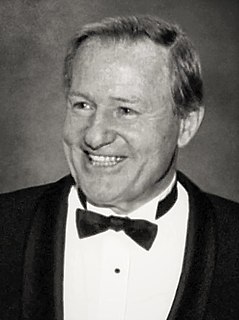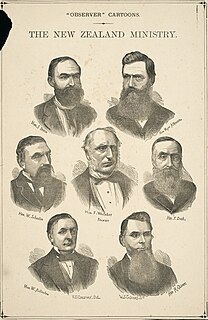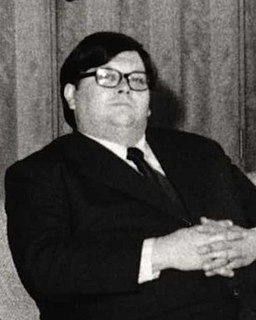
Michael Kenneth Moore was a New Zealand politician, union organiser, and author. In the Fourth Labour Government he served in several portfolios including minister of Foreign Affairs, and was the 34th prime minister of New Zealand for 59 days before the 1990 general election elected a new parliament. Following Labour's defeat in that election, Moore served as Leader of the Opposition until the 1993 election, after which Helen Clark successfully challenged him for the Labour Party leadership.

Electoral reform in New Zealand has, in recent years, become a political issue as major changes have been made to both parliamentary and local government electoral systems.

Sir Geoffrey Winston Russell Palmer is a New Zealand lawyer, legal academic, and past politician, who was a member of Parliament from 1979 to 1990. He served as the 33rd prime minister of New Zealand for a little over a year, from August 1989 until September 1990, leading the Fourth Labour Government. As Minister of Justice from 1984 to 1989, Palmer was responsible for considerable reforms of the country's legal and constitutional framework, such as the creation of the Constitution Act 1986, New Zealand Bill of Rights, Imperial Laws Application Act, and the State Sector Act. He served as president of the New Zealand Law Commission, from 2005 to 2010.

United New Zealand was a centrist political party in New Zealand founded in 1995. It merged with the Christian-based Future New Zealand party to form the United Future New Zealand party in 2000.

The 1996 New Zealand general election was held on 12 October 1996 to determine the composition of the 45th New Zealand Parliament. It was notable for being the first election to be held under the new mixed-member proportional (MMP) electoral system, and produced a parliament considerably more diverse than previous elections. It saw the National Party, led by Jim Bolger, retain its position in government, but only after protracted negotiations with the smaller New Zealand First party to form a coalition. New Zealand First's position to place either of the two major parties into government, was a significant election outcome.

The 1993 New Zealand general election was held on 6 November 1993 to determine the composition of the 44th New Zealand Parliament. Voters elected 99 members to the House of Representatives, up from 97 members at the 1990 election. The election was the last general election to use the first-past-the-post electoral system, with all members elected from single-member electorates.

The New Zealand Conservative Party was a short-lived political party in New Zealand. It was founded by a dissident National Party MP, Ross Meurant.

Clayton James Cosgrove is a former New Zealand politician. He is a member of the Labour Party.
Geoffrey Bernard Braybrooke was a New Zealand politician. He was an MP from 1981 to 2002, representing the Labour Party. He was one of the party's more socially conservative MPs.

The 45th New Zealand Parliament was a term of the Parliament of New Zealand. Its composition was determined by the 1996 election, and it sat until the 1999 election.
Jack Arnold Elder is a New Zealand former politician. He was an MP from 1984 to 1999, representing the Labour Party, New Zealand First and Mauri Pacific.

Peter McCardle, is a New Zealand politician. He was an Member of Parliament from 1990 to 1999, first as a member of the National Party, then as a member of New Zealand First, and finally as an independent. McCardle was deputy mayor of Upper Hutt from 2007 to 2013.

The 44th New Zealand Parliament was a term of the Parliament of New Zealand. Its composition was determined by the 1993 elections, and it sat until the 1996 elections.
The Fourth National Government of New Zealand was the government of New Zealand from 2 November 1990 to 27 November 1999. Following electoral reforms in the 1996 election, Jim Bolger formed a coalition with New Zealand First. Following Bolger's resignation, the government was led by Jenny Shipley, the country's first female Prime Minister, for the final two years.

Waimakariri is a New Zealand parliamentary electorate, formed for the 1996 election and returning one Member of Parliament to the New Zealand House of Representatives. The MP for Waimakariri is Matt Doocey of the National Party. He has held this position since the 2014 election and takes over from Kate Wilkinson, who defeated Clayton Cosgrove (Labour) in the 2011 election.

Te Tai Tokerau is a New Zealand parliamentary Māori electorate that was created out of the Northern Maori electorate ahead of the first Mixed Member Proportional (MMP) election in 1996. It was held first by Tau Henare representing New Zealand First for one term, and then Dover Samuels of the Labour Party for two terms. From 2005 to 2014, it was held by MP Hone Harawira. Initially a member of the Māori Party, Harawira resigned from both the party and then Parliament, causing the 2011 by-election. He was returned under the Mana Party banner in July 2011 and confirmed at the November 2011 general election. In the 2014 election, he was beaten by Labour's Kelvin Davis, ending the representation of the Mana Party in Parliament.
West Coast is a former New Zealand Parliamentary electorate, from 1972 to 1996.

The 1999 New Zealand MP reduction referendum was held during the 1999 general election on 27 November 1999. The Referendum considered two questions, in which one brought upon the question on whether New Zealand Parliament should be restructured - reducing the number of MPs from 120 to 99 members in the House of Representatives.

The Mangere by-election of 1977 was a by-election for the electorate of Mangere on 26 March 1977 during the 38th New Zealand Parliament. The by-election resulted from the resignation of the previous member Colin Moyle after accusations against him in parliament, and he was replaced by David Lange, also of the Labour Party. Apart from Lange, there were seven other candidates in the by-election.

The 1996 New Zealand Labour Party leadership election was intended to determine the future leadership of the New Zealand Labour Party. The leadership was retained by Mount Albert MP Helen Clark, who was the incumbent leader.













